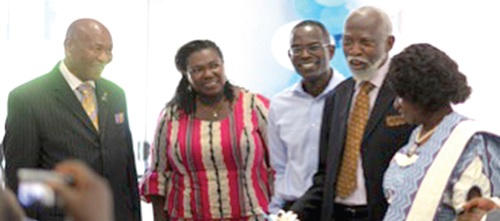
Managing on quarter tank : Professor Stephen Adei reflects on his exceptional tenure
Imagine that from the topmost to the low executive levels, every public official entrusted with a responsible position reflects on their performance publicly at the end of their tenure. But that may never happen for reasons a discerning person can infer.
Indeed, those who reflect and share their experiences do their respective nations great favours.
Advertisement
For tertiary courses I teach on Critical Thinking, and I allow the last ten minutes of every session for students and teachers to do a reflection exercise; namely, to honestly account for the time spent; what they had learnt from each other, how they had grown from that process, and the recommendations for the way forward. At the end of the course, those reflections are turned into books/binders for the school library.
On quarter tank
One of the substantive themes from Prof Adei’s book, The GIMPA Story, was the concept of “managing on quarter tank”. He wrote: “First, leading the transformation of a public sector institution in Ghana is like running on a ‘Quarter Tank’.” In other words, maintaining one’s focus amidst the variety of distractions took too much time and energy.
Secondly, the GIMPA story — like any institutional reforms everywhere – possesses some issues peculiar to many organisations, but there are generic local lessons which may be learnt in Ghana.
In a way, Prof Adei was in for a shock — on returning to Ghana — to take up a very high-level executive position. As a young man, he had worked for 12 and a half years in Ghana as an economist and middle manager before accepting a three-year stint at the Commonwealth Secretariat in London.
This was followed by eleven-and-half years with the United Nations Development Programme (UNDP) in New York, South Africa, and Namibia - before taking up the Chief Executive Officer (CEO) challenge at GIMPA.
In spite of having worked extensively in Ghana before GIMPA offered him the very first opportunity to serve as a CEO in his motherland. And it was in this role that he confronted the truest nature of the Ghanaian cultural milieu and the constraints it imposed to derail effective organisational leadership.
Undue political interferences
He wrote that in addition to the inefficiencies, bottlenecks, negative attitudes, misbehaviours and archaic systems that impede organisational leadership and management, the political class tended to interfere far too much in the management of public institutions.
For that reason, he was advised to tread carefully to avoid causing undue offence. In his opinion, the situation still persisted and it was getting worse.
In essence, a CEO's work in the public sector in Ghana includes dealing with mundane matters, navigating a tight balance of improving work ethic and addressing corruption among staff and officials — and all the while, being discrete by measuring one’s actions and words to avoid offending the political sentiments of the big people.
Based on the notion that three-quarters of the Ghanaian managerial leaders’ energies were expended on such difficulties and worries — leaving only one quarter for actual management — he developed a two-hour course to orient business and leadership students to handle the situation.
This course, he titled, “Managing on Quarter Tank".
On corruption
Another hurdle he was to overcome was corruption. So, to maintain a high level of vigilance and zero tolerance for corruption, Prof Adei was determined to stamp it out as far as it was humanly possible.
Believing that the fish rots from the head, he wrote: “If corruption went on in GIMPA, I was to blame. I was not going to rely on the fact that I was not personally involved, and yet failed to put systems in place to make corruption a high-risk phenomenon.”
For Prof Adei, the definition of corruption as using public office for personal gains was not broad enough. For him, any leader who allowed corruption to persist in their organisations was culpable even if they themselves were persons of integrity.
A leader must set the example, he says. They must not only be seen to be personally clean; they must be perceived to be so by both insiders and outsiders. Additionally, they must set up a system that makes it plain and clear that they will not tolerate corruption under any circumstances.
Looking back
There’s a sorrowful dissatisfaction in observing that one’s accomplishments in a particular institution can be derailed. When a maverick — unwavering in his vision and mission — begins to see the dismantling of all that he stood for, and worked for, what was he supposed to feel?
What was he supposed to do?
Perched on a hill from his residence in Berekuso - overlooking GIMPA — Prof Adei noted with disappointment that — in 2020, after significant attempts to return the institution to government subvention, GIMPA was now on what he called “a government facilitated life support”.
He asserted in the Prologue that “GIMPA should have no reason not to be able to pay its staff and fund future projects from internally generated funds if the transformation had been sustained.”
He added that “so long as they follow the suicidal path of becoming a ‘Little Legon’ or a miniature public university with no distinctiveness – and bordering Ghana’s premier university, Legon… GIMPA’s survival as a self-financing autonomous institute will be forever mortgaged. It no longer fills a niche market where it can charge premium fees.”
Major documentary
Prof Adei’s GIMPA Story is useful and enjoyable for yet another reason; It was so well written that it flowed in suspense with internal intrigues, characters, conflicts, dialogue and settings as we find in good novels.
One day, in the hands of a competent screenwriter or producer, Prof Adei’s GIMPA story could easily turn into a major documentary or movie.
The story is one of a kind, and most appropriate for Ghana, at this time.
E-mail: [email protected]



